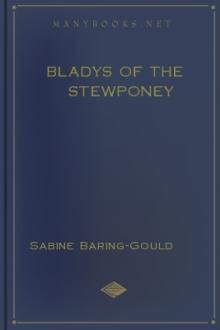The Broom-Squire, Sabine Baring-Gould [books to read this summer txt] 📗

- Author: Sabine Baring-Gould
Book online «The Broom-Squire, Sabine Baring-Gould [books to read this summer txt] 📗». Author Sabine Baring-Gould
Presently she noticed the flat-bottomed boat usually kept on the pond for the convenience of fishers; it was being propelled over the stream in her direction. A minute later, a man seated in the boat ran it against the bank and stepped out, fastened the point to a willow stump, and came towards her.
"What--is this the Squiress?"
She looked up and recognized him.
The man who came to her and addressed her was Mr. Markham, the young barrister, who had been to the Punch-Bowl to obtain the assistance of Jonas in wild-duck shooting.
She recalled his offensively familiar manner, and was troubled to see him again. And yet she remembered his last remark on leaving, when he had offered his services to help her to free herself from her bondage to Jonas. The words might have been spoken in jest, yet now, she caught at them.
He stood looking at her, and he saw both how pale she was, with a hectic flame in her cheek, and a feverish glitter in her eye, and also how beautiful she thus was.
"Why," said he, "what brings you here?"
"I have been to the silk mill in quest of work."
"Work! Broom-Squiress, one such as you should not work. You missed your vocation altogether when you left the Ship. Jonas told me you had been there."
"I was happy then."
"But are you not so in the Punch-Bowl?"
"No. I am very miserable. But I will not return there again."
"What! fallen out with the Squire?"
"He has made it impossible for me to go back."
"Then whither are you bound?"
"I do not know."
He looked at her intently.
"Now, see here," said he. "Sit down on that log again from which you have risen and tell me all. I am a lawyer and can help you, I daresay."
"I have not much to tell," she answered, and sank on the tree bole. He seated himself beside her.
"There are things that have happened which have made me resolve to go anywhere, do anything, rather than return to Jonas. I promised what I could not keep when I said I would love, honor, and obey him."
Then she began to sob. It touched her that this young man should express sympathy, offer his help.
"Now listen to me," said Mr. Markham; "I am a barrister. I know the law, I have it at my ringers' ends, and I place myself, my knowledge and my abilities at your disposal. I shall feel proud, flattered to do so. Your beauty and your distress appeal to me irresistibly. Has the Squire been beating you?"
"Oh, no, not that."
"Then what has he done?"
"There are things worse to bear than a stick."
"What! Oh, the gay Lothario! He has been casting his eye about and has lost his leathery heart to some less well-favored wench than yourself."
Mehetabel moved further from him on the tree-bole.
He began picking at the great lichen that grew out of the decaying tree, and laughed.
"Have I hit it? Jealous, eh? Jealousy is at the bottom of it all. By Jove, the Broom-Squire isn't worth expending a jealous thought on. He's a poor sordid creature. Not worthy of you. So jealous, my little woman, eh?"
Mehetabel turned and looked steadily at him.
"You do not understand me," she said. "No Jonas has not sunk so low as that."
"He would have been a fool to have cast aside a jewel for the sake of quartz crystal," laughed Markham. "But, come. A lawyer is a confessor. Tell me everything. Make no reservations. Open your heart to me, and see if the law, or myself--between us we cannot assist you."
Mehetabel hesitated. The manner in which the man offered his services was offensive, and yet in her innocent mind she thought that perhaps the fault lay in herself in not understanding and receiving his address in the way in which it was intended. Besides, in what other manner could she obtain relief? Every other means was taken from her.
Slowly, reluctantly, she told him much that she had not told to any one else--only not that Jonas had endeavored to kill the child. That she would not relate.
When she had finished her tale, he said, "What you have told me is a very sad story, and makes my heart ache for you. You can rely on me, I will be your friend and protector. We have had a case on lately, of a woman who was equally unhappy in her married life; her name was Jane Summers. You may have seen it in the papers."
"I'll never see the papers. How did Jane Summers manage?"
"She had a crabbed, ill-conditioned husband, and she was a fine, handsome, lusty woman. He fell ill, and she did not afford him all that care and attention which was requisite in his condition. She went out amusing herself, and left him at home with no one to see to his necessities. The consequence was that he died, and she was tried for it, but the case against her broke down. It could not be proved that had she been devoted to him in his sickness he would have recovered. The law takes cognizance of commission of a crime, and not of neglect of duty."
Mehetabel opened her eyes. "If Jonas were ill I would attend him day and night," she said. "But he is not ill--never was, till the shot entered his arm, and then I was with him all day and all night."
"How did he receive your ministry?"
"He was very irritable. I suppose the pain made him so."
"You got no thanks for your trouble?"
"None at all. I thought he would have been kinder when he recovered."
"Then," said the young man, laughing; "the man is not to be cured. You must leave him."
"I have done so."
"And you are seeking a home and a protector?"
"I want to earn my living somewhere."
"A pretty young thing like you," said the stranger, "cannot fail to make her way. Come! I have offered you my aid," he put his arm round her and attempted to snatch a kiss.
"So!" exclaimed Mehetabel, starting to her feet. "This is the friend and protector you would be! I trusted you with my troubles, and you have taken advantage of my trust. Let me alone! Wherever I turn there hell hath opened her mouth! A moment ago I thought of ending all my troubles in this pond--that a thousand times before trusting you further."
With beating heart--beating with anger--proudly raising her weary head, she walked away.
CHAPTER XLI.
WANDERERS.
It occurred to Mehetabel that the rector of Milford had been over at Thursley several times to do duty when the vicar of Witley was ill, and she thought that perhaps she might obtain advice from him.
Accordingly she turned in the direction of that village as soon as she had reached the road. She walked wearily along till she arrived in this, the adjoining parish, separated from Thursley by a tract of healthy common. At her request, she was shown into the library, and she told the parson of her trouble.
He shrugged his shoulders, and read her a lecture on the duties of wife to husband; and, taking his Bible, provided her with texts to corroborate what he said.
"Please, sir," she said, "I was married when I did not wish it, and when I did not know what I could do, and what was impossible. As the Church married me, can it not undo the marriage, and set me free again?"
"Certainly not. What has been joined together cannot be put asunder. It is not impossible to obtain a separation, legally, but you will have to go before lawyers for that."
Mehetabel flushed. "I will have nothing to do with lawyers," she said hastily.
"You would be required to show good cause why you desire a separation, and then it would be expensive. Have you money?"
"Not a penny."
"The law in England--everywhere--is only for the rich."
"Then is there nothing you can advise?"
"Only that you should go home again, and bear what you have to bear as a cross laid on you."
"I will never go back."
"It is your duty to do so."
"I cannot, and will not."
"Then, Mrs. Kink, I am afraid the blame of this domestic broil lies on your shoulders quite as much as on those of your husband. Woman is the weaker vessel. Her duty is to endure."
"And a separation--"
"That is legal only, and unless you can show very good cause why it should be granted, it may be refused. Has your husband beaten you?"
"No, but he has spoken to me--"
"Words break no bones. I don't think words would be considered. I can't say; I'm no lawyer. But remember--even if separated by law, in the sight of God you would still be one."
Mehetabel left, little cheered.
As she walked slowly back along the high-road, she was caught up by Betsy Cheel.
"Halloo!" said this woman; "where have you been?"
Mehetabel told her.
"Want to be separated from Jonas, do you? I'm not surprised. I always thought him a bad fellow, but I doubt if he's worse than my man, Jamaica."
After a while she said: "We'll walk together. Then we can chat. It's dull going over the Common alone. I've been selling eggs in Milford. They're won'erful dear now; nine a shillin'; but the hens feel the cold, and don't lay this time of the year much. How's the child? You didn't ort to be carryin' it about in this weather and at this time o' the year."
"I have nowhere that I can leave it, and its only home is against my heart, in my arms."
"You've run away?"
"Yes; I shall not go back to Jonas."
"I don't call that sense," said Bessy. "If you run away, run away with some one who'll take care of you. That's what I did. My first husband--well, I don't know as he was a proper husband. He called me names, and took the stick to me when drunk; so I went off with Jamaica. That I call reasonable. Ain't you got no one to run away with?"
Mehetabel did not answer. She hastened her pace--she did not relish association with the woman. "I'd have run away from Jamaica scores o' times," continued Mrs. Cheel, "only I ain't so young as I once as, and so the opportunities don't come. There's the pity. I didn't start and leave him when I was good-looking and fresh. I might have done better then. If you think a bad, cross-crabbed man will mend as he grows older, you make a mistake. They grow wusser. So you're right to leave Jonas. Only you've gone about in the wrong way. There's Iver Verstage. I've heard talk about him and you. He don't live such a terrible distance off. I hear he's doin' purty well for himself at Guildford. Why don't you go to him? He's more suitable in age, and he's a nice-lookin' young fellow."
"Mrs. Cheel," said Mehetabel, standing still, "will you go forward a little faster? I cannot walk with you. I do not ask you for any advice. I do not want to hear what you have to say. I have been to the parson.





Comments (0)